Russia This Week is a weekly review by the MEMRI Russian Media Studies Project, covering the latest Russia-related news and analysis from media in Russia, the Caucasus, Central Asia, and Eastern Europe.
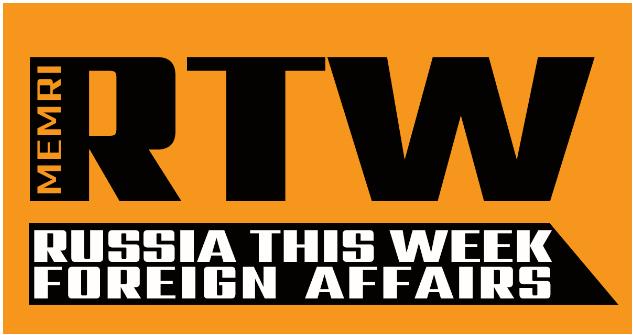
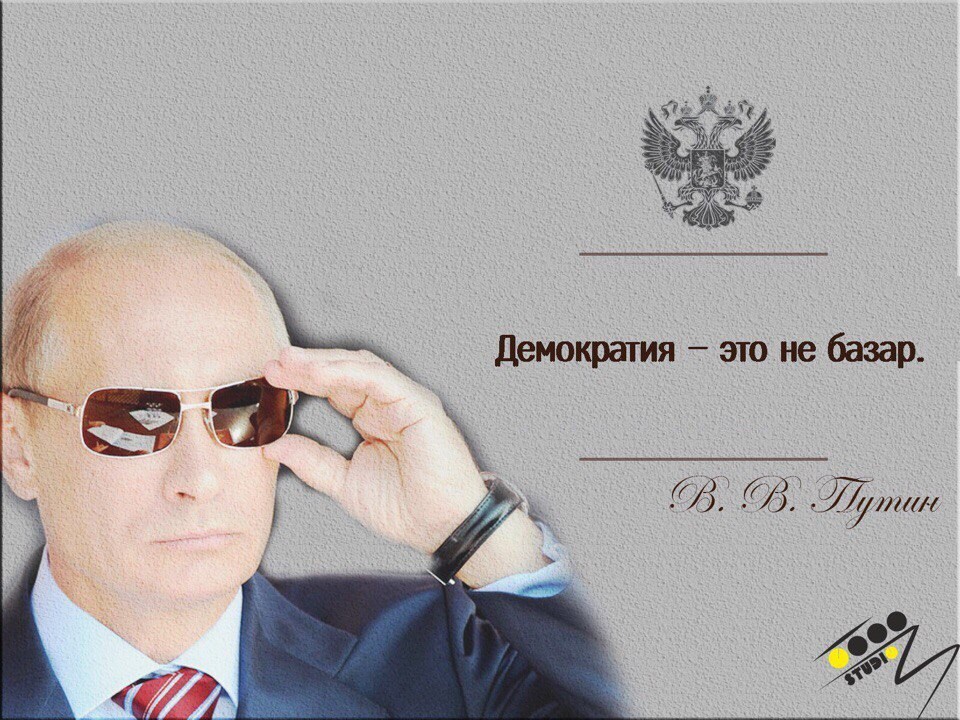
(Vk.com/13studiya, March 13, 2017)
Quoth Putin: "Democracy is not a street bazaar"
Zakharova Dixit
Russian Foreign Ministry spokesperson Maria Zakharova is one of the most-quoted Russian officials. She is known for using colorful language when describing Russian foreign policy in her weekly press briefings. The following are Zakharova's quotes of the week:
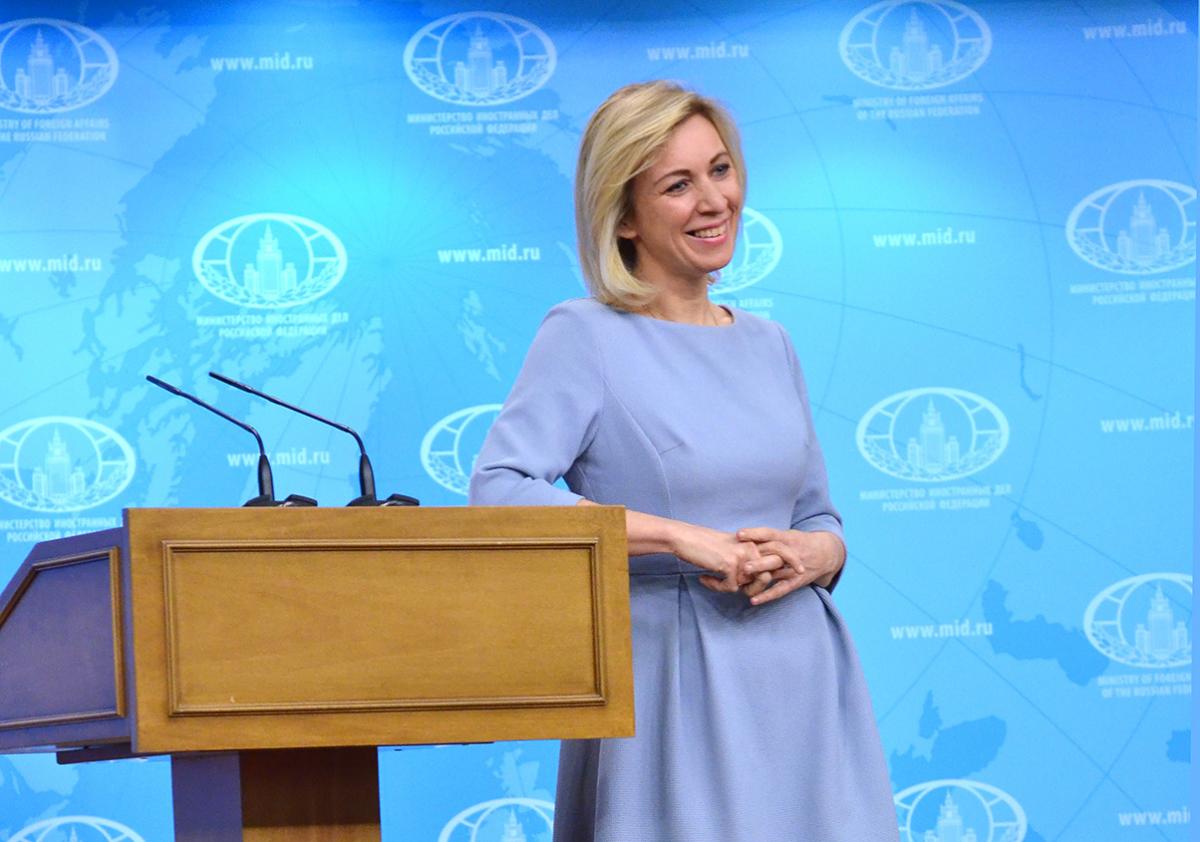
(Source: Mid.ru)
"On these March days, we celebrate the third anniversary of a landmark event in the modern history of Russia, which received the poetic name of the Crimean Spring.
The proclamation in March 2014 of the independence of the Republic of Crimea and its unification with the Russian Federation were a legitimate exercise of the right of the people of Crimea to self-determination following an armed coup in Ukraine and the mayhem wreaked by radical national forces that did not hesitate to use terror and intimidation on both political opponents and the population of entire regions of that country.
"In these circumstances, on March 17, 2014, the Supreme Council of the Republic of Crimea, based on the results of the general referendum in Crimea on March 16, decided to proclaim Crimea an independent sovereign state, the Republic of Crimea. On March 18, the Republic of Crimea signed an international treaty to join the Russian Federation. As a result, the Russian Federation gained two new constituent entities, the Republic of Crimea and the federal city of Sevastopol.
"The future has proved the legitimacy of the decision to reunite with Russia taken by Crimeans three years ago. The legality and validity of this exercise of the right to self-determination are on graphic display today, in light of the disgraceful bloody campaign waged by the Kiev regime against its own people. Extrapolating Ukrainian political realities of recent years to Crimea, it is easy to imagine what would have happened to the peninsula had it remained part of Ukraine. It is even easier to imagine if we recall the deplorable outcome of the twenty-odd years in which Crimea was part of the Ukrainian state."
(Mid.ru, March 16, 2017)
Pushkov’s Tweet Storm
Senator Alexey Pushkov (@Alexey_Pushkov) tweeted: "It turns out that the entire American elite is connected to Russia. Now it's about [U.S] Attorney General [Jeff Sessions]. The paranoia knows no limits. Could it be that McCain is also connected to Russia?"
(Twitter.com/Alexey_Pushkov, March 1, 2017)
Pushkov wrote: "I took part in debates on Syria with McCain in Davos in 2013.We exchanged a few words. Should he be investigated now for his 'Russian ties'?"
(Twitter.com/Alexey_Pushkov, March 2, 2017)
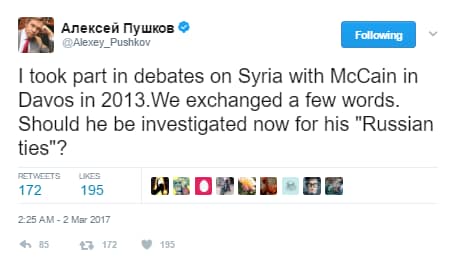
(Twitter.com/Alexey_Pushkov, March 2, 2017)
Pushkov tweeted: "The American hysteria has trapped the politicians. Met with a Russian? End of career. Kept silent about it? Go to jail. The spirit of Joe McCarthy was merely awaiting its hour [of opportunity]."
(Twitter.com/Alexey_Pushkov, March 2, 2017)
Quotes Of The Week
Commenting on U.S. Secretary of Defense James Mattis' statement that the U.S. should talk to Russia from a "position of strength," Deputy Prime Minister Dmitry Rogozin said:
"This surprised me. I know James Mattis quite well. I visited him in Norfolk when I served as Russia's representative to NATO. He's a lively, interesting and outgoing person. Perhaps, while absent from the Pentagon, he fell behind a bit and is unaware of the Russian defense industry's serious technological and production progress. Perhaps, he has some illusions regarding "old rusty Russian missiles". Once he has sort things out, such statements will hardly be possible. If we speak about material-technological insurance of our country's security and defense, I cannot imagine how anyone may talk to Russia from the position of force. We do possess force ourselves. We recovered this force and the country's might. They must reach agreements with us. At the moment, Russia is the only country in the world which is capable of deterring any aggressor - any leader of the Western world armed to the teeth along with his surroundings. We may deter him at any point in the world. It's a fact already."
(Interfax.ru, March 2, 2017)
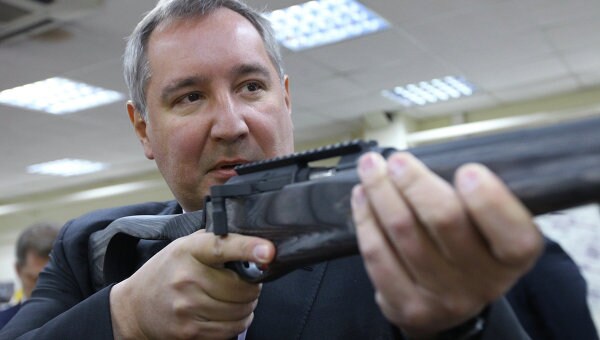
Deputy Prime Minister Dmitry Rogozin (Source: balalaika24.ru)
In The News:
Huntsman's Appointment As U.S. Ambassador To Russia
In March, the former Utah governor Jon Huntsman Jr. was tipped to become the new U.S. ambassador to Russia. The following are some of the reactions to the prospective appointment:
Alexey Venediktov, editor in chief of Echo Moscow, said: "[Huntsman's] views on deterring Russia is evident. He's definitely a 'hawk' as they understand the term in the Kremlin. But, he is mirroring the Trump administration. In a way, all Trump's senior administration officials are 'hawks.' Huntsman will get a sort of carte-blanche, that's for sure: to calm down the situation and negotiate the mutual fight against terror. No way to negotiate [with him] a way out regarding Ukraine – that's obvious, because talking on Ukraine, Huntsman took McCain's position including the supply of lethal weapons".
(Echo.msk.ru, March 9, 2017)
Prof. Alexander Domrin, an expert on U.S. affairs with Moscow's Higher School of Economics, said: "I don't see any good coming out of this appointment. Huntsman was never too positive commenting on Russia. Let's also not forget that he's a Mormon. Mormons always paid [a negative] attention to Russia".
(Ria.ru, March 9, 2017)
Russian presidential spokesman Dmitry Peskov said: "We will welcome any new head of the U.S. embassy in Moscow who will display firm commitment to the idea of establishing a dialogue between the two countries."
(Tass.com, March 9, 2017)
SUPPORT OUR WORK

Arms Race
Commenting on the increase of the U.S. defense budget, Russia’s Speaker of the Federation Council, Valentina Matviyenko said: "We’ll watch the developments closely but we won’t be drawn into the arms race and at the same time we’ll take sufficient measures to strengthen our national security."
(Tass.com, March 1, 2017)
Commenting on U.S. President Donald Trump's criticism on the new START Treaty of 2010, Russian Deputy Foreign Minister Sergey Ryabkov said: "We consider the START Treaty of 2010 a mutually useful instrument, a balanced document that does not contain any unilateral concessions to anyone whomsoever and that really strengthens security." Ryabkov then added:"We consider these statements [by Trump on the START arms treaty and the U.S. nuclear potential] as an obvious occurrence. They have not become a surprise for us as they fit into the political line that has been shaped by representatives of the new U.S. administration’s leadership in this area."
(Tass.com, February 28, 2017)
Deputy Defense Minister Alexander Fomin said that Russia is ready to discuss a revision of the START Treaty with the U.S. on measures for the further reduction and limitation of strategic offensive arms: "The Treaty operates and is in force. I believe that it is necessary to work on the existing Treaty while all the other things are insinuations and conjectures. If such an idea comes up and our U.S. colleagues are ready for talks, we’ll discuss it."
(Tass.com, February 28, 2017)
Yuri Baluevsky, former Chief of the Russian General Staff, said that the Russian army "will prepare the asymmetrical response and will have enough nuclear weapon to guarantee the nuclear deterrence".
(Echo.msk.ru, February 24, 2017)
On his Facebook account, Senator Konstantin Kosachev, head of the Foreign Affairs Committee of the Russian Federation Council, wrote: "If Trump's election slogan 'Make America great again' implies 'superiority in nuclear sphere', then it will take the world back to the worst moments of the arms race in the 1950-60s, when the opposing sides attempted to guarantee their national security by achieving a superiority over the enemy. In the 1970-80s there was a mutual understanding that one-sided military superiority over the adversary was unattainable, since neither side would allow it to happen, and that it was quite enough not to let the adversary obtain the superior position, i.e negotiate a balance of forces". In his post Kosachev also called for the urgent renewal of negotiations on START III treaty and its continuations. According to him, if the treaty, which Trump previously called "a bad deal" is not renewed then the world, for the first time in decades, will face a situation where the sides are not limited by a compulsory legal framework regarding their nuclear potential.
(Facebook.com/profile.php?id=100002123135703&fref=nf, February 23, 2017)
On February 3, senator Kosachev said: "I believe it is necessary to resume our negotiations with the U.S. on START-3 as soon as possible… This treaty is the most important document concerning strategic stability and the nuclear forces balance, however, in the past six years there have been no consultations on it."
(Tass.com, February 10, 2017)
It is worth noting that on February 23, on the Defender of the Fatherland Day, Russian President Vladimir Putin said: "We will definitely continue to strengthen the Armed Forces in regard to its personnel and organizational issues and will boost their mobility and combat capabilities." He then added: "Among the priorities are reinforcement of the strategic nuclear shield and current Aerospace Force along with strict implementation of the state armaments program."
(Tass.com, February 23, 2017)
See MEMRI Special Dispatch No. 6824, Russian Military Analyst Goltz: 'The Russian Bosses Are Raising The Stakes In The Deterrence Game, Hoping To Bring Washington To The Negotiation Table', March 10, 2017.
Russia's Defense News
Russia has signed a large contact on the delivery of T-90MS main battle tanks to a Middle East country. Russia’s Industry and Trade Minister Denis Manturov said: "A large-scale contract was signed with a Middle East country in December. Another contract on this type of military output is expected to be signed soon." The T-90MS tank was tested over two years in several Mideast countries.
(Tass.com, February 20, 2017)
Negotiations between Russia and Turkey over a likely purchase of S-400 missile systems proceed positively; Turkish Foreign Minister Mevlut Cavusoglu said that the negotiations with Russia over the purchase of S-400 missiles "are going on positively."
(Tass.com, February 21, 2017)
Russian Defense Minister Sergey Shoigu said: "Russian-Chinese military-technical cooperation has been developing positively. Contacts have been concluded for selling to China S-400 air defense systems, multirole fighters Sukhoi-35 and anti-ship systems."
(Tass.com, February 21, 2017)
Defense Minister Sergei Shoigu stated that the Russian Army will switch over to Iskander tactical missile systems in 2017. Shoigu said: "We’ll complete the rearmament and the switchover to Iskander complexes across the country this year. Some of our [radar] stations are on experimental combat duty today but this year all of them will switch over to the mode of combat alert and we’ll fully cover the entire perimeter, all the country’s radar field for missiles of all types, all trajectories, including ballistic paths."
Russian Army Commander-in-Chief Colonel-General Oleg Salyukov stated that over 80% of Russia’s missile formations switched from Tochka-U tactical missile systems to the advanced Iskander-M complexes. Salyukov said: "Work continues in the ground forces to rearm military units and formations with the modern types of armament and military hardware. The ground forces’ missile formations are switching over in a planned procedure from the Tochka-U tactical missile complex to the Iskander-M system. As of today, over 80% of missile formations have received the new missile systems." counter-measures.
(Tass.com, February 22, 2017)
Russian Defense Minister Sergey Shoigu will sign a military and technical cooperation agreement with Qatar during his visit to Doha. The Russian Ambassador to Qatar Nurmakhmad Kholov said: "Upon an invitation from Russian Defense Minister Sergey Shoigu, he [the Qatari defense minister] visited the Army-2016 expo in September of 2016, when an agreement on military cooperation was signed stipulating an exchange of experience and delegations and education at military institutes."
(Tass.com, February 20, 2017)
Russia-Egypt Relations
Russian Vice-Premier Dmitry Rogozin met with Egyptian President Abdel Fattah al-Sisi. After the meeting, Russian Deputy Foreign Minister Mikhail Bogdanov: "A very close and trustworthy political dialogue exists between our heads - Russian President Vladimir Putin and President of the Arab Republic of Egypt al-Sisi… During Rogozin’s meeting with the [Egyptian] president, the sides confirmed the strategic nature of our relations and the understanding of the situation in the region and placed the main emphasis on the struggle with the terrorist threat, which concerns the governments of both countries."
(Tass.com, March 1, 2017)
THAAD in South Korea
Discussing the deployment of a U.S. missile defense systems in South Korea to counter threats by North Korea, the head of the State Duma’s International Affairs Committee, Leonid Slutsky, said: "In effect, Washington is creating a new regional segment of the U.S. global missile defense system in North-Eastern Asia, close to the Russian border. This may put the security of our country at risk." He then added: "[The] U.S. moves to deploy the THAAD missile system in South Korea cause concern… Washington states that these systems are intended only for deterring a missile threat from Pyongyang, whose leadership indeed makes unpredictable and dangerous moves towards carrying out new tests and launches. However, the deployment of the US missile defense system in the region is clearly beyond the task of deterring 'the North Korean threat'." Slysky also noted that this move "undermines the strategic balance."
(Tass.com, March 7, 2017)
Commenting on the issue senator Viktor Ozerov, chair of Federation Council defense and security committee said: "By using the North Korea threat as an excuse, they [the U.S.] want to encircle Russia from the West and the East –they want to close the ring around us."
(Vmeste-fr.tv/news/201314.do)
Senator Ozerov also commented: "The deployment of THAAD clearly undermines the balance of power, set in the START III treaty. Such a deployment – is one of the terms , written in the text that allows Russia to exit it."
(Ria.ru, March 7, 2017)
Later, he added a more softened version: "This does not mean explicitly that we will quit the treaty, but this deployment is an issue for negotiations (with the US) in order to restore the balance [between defensive and offensive systems deployed]. We should look into the issue and take a decision."
(Ria.ru, March 9, 2017)
Commenting on the THAAD deployment, the Russian Foreign Ministry wrote: "According to recent reports, deployment of the U.S. THAAD missile defense system in South Korea has begun. This means that Washington’s plans to expand the geography of deployed elements of the US global missile defense system, including in the Asia Pacific Region, are now being executed.
"This course of events may have grave consequences for global and regional strategic stability. A new destructive factor is emerging in Asia Pacific, which may aggravate an already tense security situation in the region by undermining efforts to find solutions to the nuclear and other issues confronting the Korean Peninsula and triggering an arms race in the region, including with respect to missiles."
(Mid.ru, 9 March, 2017)
Erdogan's Visit To Moscow

Vladimir Putin and Recep Tayyip Erdogan at the sixth meeting of the High-Level Russian-Turkish Cooperation Council. (Source: Kremlin.ru)
Russia's President Vladimir Putin and President of Turkey Recep Tayyip Erdogan took part in the sixth meeting of the High-Level Russian-Turkish Cooperation Council.
During the meeting, Putin said: "… Let me emphasize that Turkey is one of Russia’s main trade partners, while Russia is a key export market for Turkey. However, we have to acknowledge that bilateral trade has been declining in recent years. In 2016, it shrank by almost one third, all but reaching a level last seen a decade ago. We hope that we will be able to reverse this negative trend as soon as this year. This is what the intergovernmental commission aims to achieve, as does the intergovernmental program on trade, economic, scientific and technical cooperation to be adopted today.
"We also need to further stimulate mutual investment. Russia and Turkey have already reached significant results in terms of mutual investment, which stands at about $10 billion on each side. Of course, much more can be achieved. Proactive efforts by the Russian-Turkish investment fund are also to bring about new projects.
"It is gratifying that we have been able to establish strategic cooperation in the energy sector. Turkey is Russia’s second largest natural gas importer. Last month, the intergovernmental agreement on the major project to build the Turkish Stream gas pipeline network came into force. This project will help increase natural gas supplies to Turkey and develop its transit potential.
"Rosatom is designing the Akkuyu nuclear power plant, the first nuclear power facility in Turkey. Power Machines is involved in upgrading Turkey’s hydropower infrastructure. There are also great prospects for expanding cooperation in the metals industry, car manufacturing, production of agricultural produce and machinery.
"Business communities in both countries are interested in expanding cooperation in such areas as innovation, research and technology. By stepping up bilateral economic ties, we could increase the share of mutual settlements in national currencies, and we know that the President is a proactive supporter of initiatives of this kind. Creating infrastructure in Turkey for the Mir Card Payment System would be a concrete step in this direction, as we have mentioned today during the one-on-one meeting…"
The President of Turkey Recep Tayyip Erdogan: "… In our official statements, I believe we can dispense with the phrase 'normalization of relations' because we believe we have already passed this stage on issues such as Syria and regional security. We have considered these issues. We often hold telephone conversations in the course of which we address these issues.
"Of course, we should keep our communication channels, our diplomatic channels open… I would like to make is that it is necessary to increase the frequency of flights between our countries, making them unlimited. Secondly, we should promote cooperation and get Turkish industrialists involved in the supply of Russian-made MS-21 airplanes.
"Our energy cooperation is very close today. I would like to mention primarily the Turkish Stream project, which is already under way. Regarding the construction of the Akkuyu nuclear power plant, the rapid implementation of this project is of vital importance to us. We constantly monitor the development and implementation of these projects. As for our military cooperation, we addressed it in the course of our one-on-one talks. Cooperation in this area is very important.
"On regional security, I believe we should work together to stop the bloodshed in Syria and put an end to that situation. Our services, which are responsible for freeing northern Syria of terrorist elements, are doing a very important job, working intensively. As for the activity of Syrian groups affiliated with the PKK terrorist organization, such and PYD and YPG, I believe it is necessary to completely put an end to their activity in Russia. Regarding the FETO terrorist organization, unfortunately, we know that under the guise of other organizations, they are active in certain Russian cities, as well as in Moscow and St Petersburg. We believe that the Russian authorities will take steps to put an end to that activity.
"The new round of tension in relations between Azerbaijan and Armenia is a very important issue. I believe it is essential to begin talks on this issue in the near future. I also think that Russia could play a very important part there…"
(Kremlin.ru, March 10, 2017)
During the joint news conference, Erdogan said: "… In this regard, we expect Russia’s full removal of economic restrictions imposed on our country. This is the only way we will be able to achieve the previously announced goal of raising bilateral trade to the level of $100 billion." Concerning Syria, Erdogan added: "Turkey is a country that has been battling terrorism for 35 years and now it faces a threat from such groups as ISIS, the Democratic Union Party (PYD), the People’s Protection Units (YPG) and Jabhat al-Nusra.
"Syria’s territorial integrity and national unity must not be jeopardized. We will continue to search for a just resolution of the Syrian conflict in cooperation with Russia. Although we may not see eye-to-eye on various issues, we have so far kept cooperation channels open and are determined to continue to do so in the future. We see major advantages in this approach. We expect to continue our joint efforts based on mutual trust.
"Of course, close cooperation between Turkey and Russia, based on mutual interests and aimed at promoting stability in the region and the world may irritate certain forces. However, we will not succumb to provocations and will not allow terrorist organizations to poison our relations…"
(Kremlin.ru, March 10, 2017)
Tripartite U.S.-Russia-Turkey Military Chiefs of Staff Meeting
The head of the general staff of the Russian armed forces Valery Gerasimov met Monday in Antalya with colleagues from Turkey and the US to discuss the situation in Syria and Iraq, the Russian Defense Ministry reported.
The head of the Russian Federation's armed forces general staff Valery Gerasimov, the head of the Turkish forces general staff , H. Akar and the Chairman of the American Joint Chiefs of Staff Joseph Dunford participated in a trilateral meeting in the city of Antalya. At the event a joint discussion of security problems in Syria and Iraq was scheduled, the press release stated.
(Ria.ru, March 9, 2017)
See MEMRI Inquiry and Analysis No. 1303, 'Iran Diplomacy' Following Tripartite U.S.-Russia-Turkey Military Chiefs of Staff Meeting: 'If You Aren't Sitting At The Table, You Are Being Eaten At The Table', March 15, 2017.
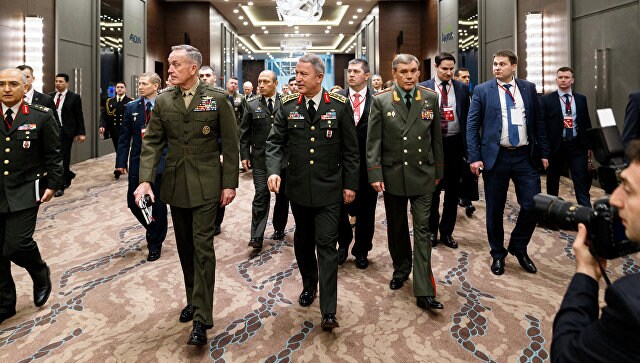
(Source: Mil.ru)
Kurdish-Russian Relations
Quoting a Russian Ministry of Defense source, Vedomosti newspaper wrote that the Kurdish forces, rather than the Syrian Army will likely proceed towards the ISIS stronghold of Raqa. Moreover, the newspaper, quotes a military expert Viktor Murakhovsky, saying that Russia and the US are cooperating on the ground: Russian and American military convoys around Kurdish city of Manbij are supposed to "curb Turkey's appetite" and deter Turkish forces from advancing deep into Kurdish-held territory. According to an unidentified military source, quoted in the article, the recent meeting between Russian, Turkish and American Chiefs of Staff were not about establishing spheres of influence in Syria, but rather about setting concrete lines in order to avoid accidental clashes between the forces.
(Vedomosti.ru, March 9, 2017)
According to an article in Gazeta.ru, Erdogan is annoyed by the existence of a Kurdish interests' office in Moscow. Aleksandr Kirpichev, political expert said: "The Turkish president came to pay a call on Russia to stop any kind of cooperation with the Kurds, especially with the PKK and Syrian Kurdish party " Democratic Alliance" (both are not considered by Russia to be terror organizations). Erdogan deems it very important to prevent Russia from cooperating with the Kurds in Syria – especially in the zone of Turkish military operation, since the longstanding goal of Ankara is to create a buffer zone between the border and Kurdish territories in Syria. The mere fact that the Moscow office of the Kurdish "Democratic Party" still exists forces Erdogan to make concessions on other issues while relying on Moscow's cooperation against the Kurds".
(Gazeta.ru, March 10, 2017)




